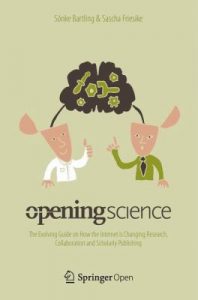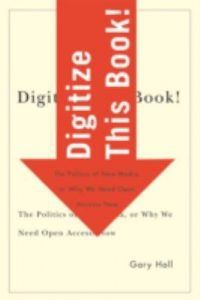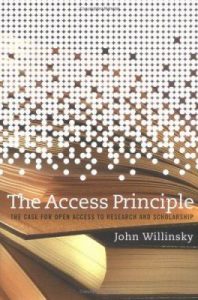On this last Theme Thursday of the 2017-2018 academic year, we consider a quiet revolution  happening within academic publishing. The publishing revolutionaries aim to make all publicly funded research – and possibly all research – freely available to any curious reader. This is in contrast to the current conventional publishing model in which researchers use grant money to conduct studies, which are then published in an academic journal that is funded by journal subscriptions. The radical change, which has been discussed in previously smoke-filled rooms in universities and publishing houses alike for at least the past 10 years, is being driven by weighty institutions such as the National Science Foundation.
happening within academic publishing. The publishing revolutionaries aim to make all publicly funded research – and possibly all research – freely available to any curious reader. This is in contrast to the current conventional publishing model in which researchers use grant money to conduct studies, which are then published in an academic journal that is funded by journal subscriptions. The radical change, which has been discussed in previously smoke-filled rooms in universities and publishing houses alike for at least the past 10 years, is being driven by weighty institutions such as the National Science Foundation.
Only occasionally does the matter enter the consciousness of those outside the arena, as it did for example at the end of last year, when a recent Nobel Prize winner called for academics to stop submitting their work to the pukka journals such as Cell, Nature and Science. Dr Randy Schekman, who runs a laboratory at the University of California, called for the boycott because he believes researchers and scientists are being inappropriately influenced by the need to get their work disseminated by these prestigious publications. He also claimed that the top-flight journals, aware of their prestigious position, artificially restrict the number of papers they accept.
At first sight the change to so-called open access might not seem so revolutionary; surely  scientific research should be freely available to all? What really is the big deal? The answer, in part at least, is vast sums. Elsevier, the world’s largest academic journal publisher – producing more than 90 journals including The Lancet as well as several others aimed at psychiatrists and allied professionals (e.g. Schizophrenia Research, Biological Psychiatry and Psychiatric Research) – in 2012 had a margin of 38% on revenues over $2 billion. Similarly, in 2011, German-owned Springer, which acquired BioMed Central in 2008, made 36% on sales of almost $9 million.
scientific research should be freely available to all? What really is the big deal? The answer, in part at least, is vast sums. Elsevier, the world’s largest academic journal publisher – producing more than 90 journals including The Lancet as well as several others aimed at psychiatrists and allied professionals (e.g. Schizophrenia Research, Biological Psychiatry and Psychiatric Research) – in 2012 had a margin of 38% on revenues over $2 billion. Similarly, in 2011, German-owned Springer, which acquired BioMed Central in 2008, made 36% on sales of almost $9 million.
Here are a couple resources in Ames worth your time, to help you catch up on issues related to Open Access and scholarly publishing.
 The state of scholarly publishing: Challenges and opportunities, Albert N. Greco, editor
The state of scholarly publishing: Challenges and opportunities, Albert N. Greco, editor
Digitize this book!: The politics of new media, or why we need open access now, by Gary Hall
Open access: What you need to know now, by Walt Crawford
The access principle: The case for open access to research and scholarship, by John Willinsky
Why does this matter to you? One thing your tuition dollars help support are subscriptions to databases and journals. All those times you Google an article or access something on campus (or off-campus with your campus ID and password), you’re accessing materials the library pays for through agreements. So you benefit when materials are more broadly available.
